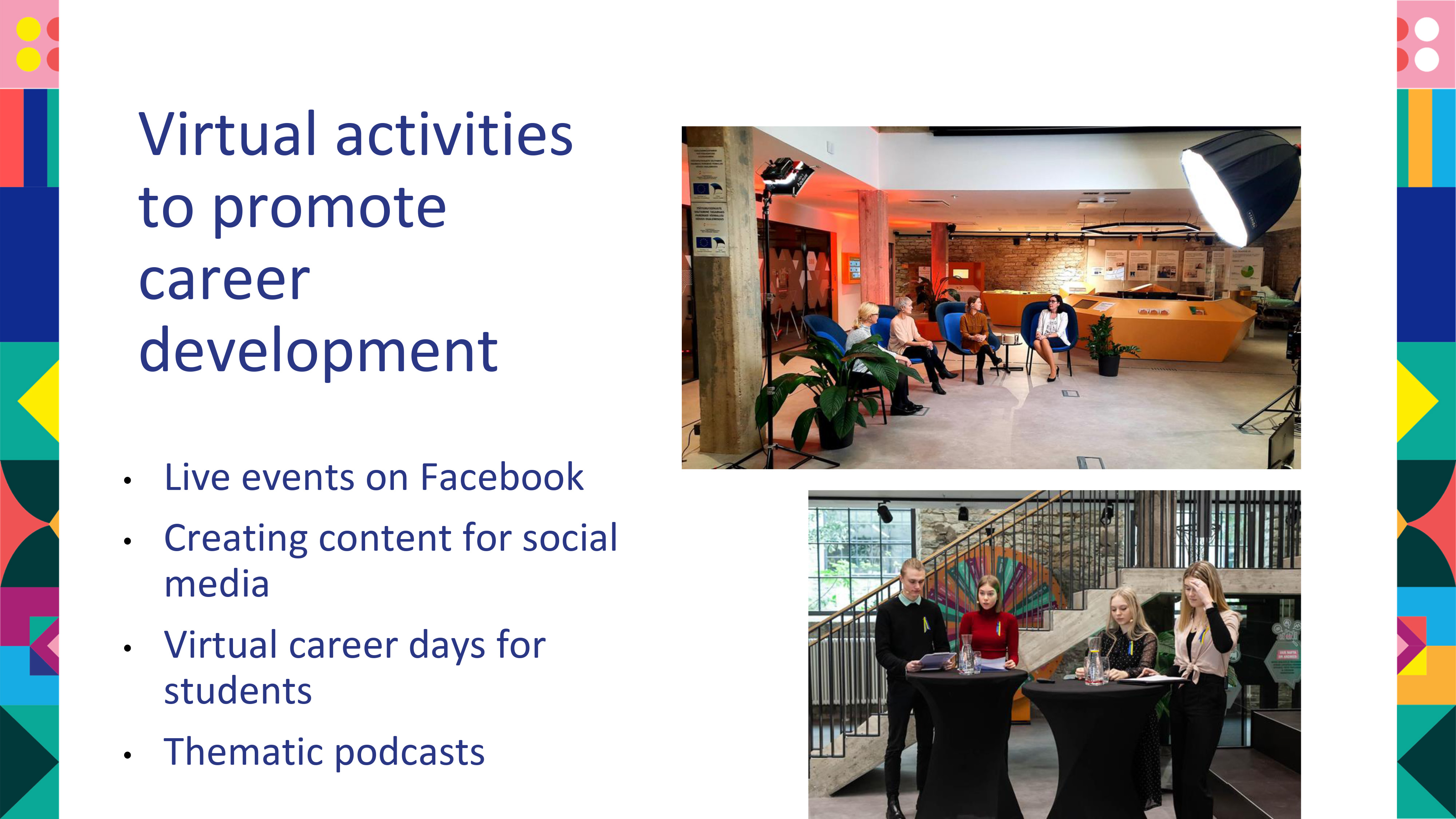Digital Solutions to Support Guidance in Estonia
Authors: Kristina Orion and Margit Rammo
Introduction of Institutions
The Estonian Unemployment Insurance Fund (abbreviated as EUIF; in Estonian, Eesti Töötukassa) acts as a public employment service (the PES) and is responsible for the payment of labour market benefits and the provision of active and passive labour market measures, including the career information service and career counselling across the country. Methodological development and support for employees is provided by a team in the central office.
Euroguidance Estonia is the National Resource Centre for Guidance, which focuses on competence development of career guidance professionals, providing a range of services to Estonians and professionals abroad. As a member of the Euroguidance Network, the centre provides support in the areas of learning mobility and career development within education and employment. The centre operates as part of the national Agency for Erasmus+ and the European Solidarity Corps.
Estonian E-story and Strategic View
Estonia has a rich history of digital solutions and e-governance, dating back 20 years with a step-by-step approach. The country has invested heavily in digital services due to factors such as its small population, limited budget, and finite manpower. There are several factors that came together in the end – some of them provide the factual context, others depend on more intangible things such as culture and values. Equally important as these fundamental challenges was the fact that Tallinn had been the home of the Soviet Union’s cybernetics institute since the 1960s, so some of the required IT talent was already in place. Another factor may very well have been Estonian culture – Estonians are not the most talkative people on earth so, for them, digitalisation would save not just time and money but also the need to interact with people at government offices.

Trying out Estonian online tools during Workshop (c) OeAD/APA-Fotoservice/Hörmandinger
The educational digital revolution of Estonia aims to implement modern digital technology more efficiently and effectively into learning and teaching, to improve the digital skills of the entire population, and to ensure access to a new generation of digital infrastructure. In practice, this means that the digital culture is integrated into the process of learning at all educational levels and in all curricula. Ensuring the technological support of education for management, teachers, and students is a prerequisite for educational innovation inspired by technological innovation. The state, for its part, guarantees digital learning resources (e-textbooks and workbooks, open learning materials, etc.) for achieving the goals and learning outcomes set in the curricula of primary, secondary, and vocational schools. This includes ensuring that every student has access to a personal digital device to access the modern digital infrastructure. To achieve this, digital competence assessment and recognition systems are created and implemented.
Finally, Estonia has also adopted a lifelong learning strategy because it understands that the private sector’s expectations towards the labour force continue to change. Thus, both state and private sector companies offer a variety of (often free) IT courses for enthusiasts of any age. This provides the opportunity for people to educate themselves and increase their digital skills while making it easier to make the necessary changes in their career.
Digital Solutions and Lifelong Guidance
The daily work of career guidance practitioners is intertwined with the use of various information and communication technology (ICT) solutions. The use of ICT here is multifaceted: Practitioners are both users and the creators of new values through the use of ICT solutions. The ICT solutions can be broadly divided into the following two groups:
- for service provision, including web pages, databases, educational software, games, social media channels, and e-tests; and
- for internal processes, including documentation management, customer management, feedback solutions, information exchange in cloud-based solutions, and e-learning environments.
 In the education sector, the central portal to support individuals’ career development is the education portal edu.ee, which gives an overview of learning opportunities and labour market information. Both young people and adults as well as teachers and other professionals access information about the education system and institutions, curricula, certificates, but also occupations, qualifications, and the needs for labour and skills. E-schoolbag is a rich source of digital learning materials for both practitioners and parents to support skills development, including career management skills.
In the education sector, the central portal to support individuals’ career development is the education portal edu.ee, which gives an overview of learning opportunities and labour market information. Both young people and adults as well as teachers and other professionals access information about the education system and institutions, curricula, certificates, but also occupations, qualifications, and the needs for labour and skills. E-schoolbag is a rich source of digital learning materials for both practitioners and parents to support skills development, including career management skills.
The main thematic website provided by the EUIF is minukarjäär.ee (My career), which recently underwent a thorough overhaul. The aim was to create a website to support independent career planning for both youth and adults. The central idea revolves around different career paths, where the user can choose their role and main career question and easily access trustworthy information and the tools they need. The website includes information about career possibilities, interactive tools, questionnaires, etc. for supporting one’s career journey. In addition, a toolbox for career specialists and teachers provides materials, resources, and tools about career development.
E-guidance via e-mail, telephone, and Skype has a long history at the EUIF. Guidance by e-mail and telephone was launched in 2015. Skype guidance was also available, but not heavily utilised. When the COVID-19 crisis began, although most of the practitioners had some experience in e-guidance via different channels, additional training seminars for PES practitioners were offered. Service provision was also switched from Skype to Microsoft Teams, which was considered more secure.
There are various ways to make career counselling experience more interactive and educational for clients. The digital tools are not just for virtual counselling, but also for on-site use. In Tallinn, the Interactive Career Centre was opened, where clients can use interactive tools on-site and discover their skills, interests, and different pathways. The aim was to support independent career planning online and, if need be, enable people to get additional information and counselling from career specialists on-site.
The Role of Career Specialist
The professionalism of Estonian career specialists in recent decades has been developed mainly without specific educational programmes, but by courses offered by various training providers. There is no academic qualification obtainable for the professionals – most have a higher education degree in social or educational sciences (e.g. psychology, economics and business administration, pedagogy, teacher training). However, higher education institutions offer a variety of subjects, specific micro-credentials are the new initiative, and continuous professional training as well as peer coaching are available from national agencies and private providers to ensure the development of the practitioners’ professional competencies on the basis of the requirements. Training is also often held in e-learning environments such as Moodle or includes virtual meetings with trainers.
Furthermore, the occupational qualification system, including the occupational qualification standard, the system of awarding occupational qualifications, and the register of professions, is established to ensure the professional development of practitioners in career guidance.
The standard describes occupational activities and provides the competence requirements for a profession and their levels. In practice, the standard is used as a basis for compiling curricula and training programmes that meet the requirements of the labour market; as a basis for competence assessment; to assist employers in describing and introducing occupations, recruiting employees, compiling job descriptions, and defining professional requirements; and to help professionals assess their own skills gaps or for their own career development. The professional standard for career specialists describes the occupational activity and competence necessary for practicing career guidance, i.e. skills, knowledge, and attitudes necessary to work successfully. The current competence-based standard for career specialists is valid at EstQF levels six and seven, equivalent to a bachelor’s degree and professional higher education certificate and a master’s degree. The main difference between the levels is that in addition to the service provision, the level seven practitioner has more extensive experience and competences at the national or international level, e.g. using new tools, curricula, research, or training.
The outcome of the system of awarding occupational qualifications is a professional certificate, an electronic entry in the register of professions, and a document which certifies the compliance of the applicant’s competence with the requirements of the professional standard. In the field of career guidance, the Association of Estonian Career Counsellors has been legally appointed as the awarding body, which is responsible for ensuring impartiality in the process and for setting up a professional qualifications committee. According to the Professions Act, the committee involves stakeholders with an interest in the awarding system: specialists, employers, and unspecified representative employees, trainers, representatives of occupational associations, and, if necessary, client representatives, as well as other interested stakeholders. The register of professions is a state database with information on valid occupational qualifications, professional standards, awarding bodies, and professional certificates.
In conclusion, digitalisation and internationalisation are rapidly evolving areas which affect people, and thus attention is needed in developing the competences of career guidance professionals. To provide practitioners maximum support for their professional development, studies are needed on current and future needs, followed by suitable training opportunities for professionals.

About this text
This blog is based on a speech and workshop held during the Austrian Euroguidance Conference 2022 "Online Guidance - Building Relationships in Digital Settings".
About the authors
Kristina Orion works for the Estonian Unemployment Insurance Fund
Margit Rammo is manager of Euroguidance Estonia, within the Estonian Education and Youth Board

Kristina Orion and Margit Rammo at Austrian Euroguidance Conference 2022
(c) OeAD/APA-Fotoservice/Hörmandinger
References:
Ernesaks, A., Purge, l., Auger, K. (2020). Karjääriteenuste valdkonna kutsesüsteemi fookusgrupiuuring. (Occupational qualification system in the field of career guidance: focus group study). SA Archimedes. https://eeagentuur.ee/materjalid/karjaariteenuste-valdkonna-kutsesusteemi-fookusgrupiuuring/
Pata. K., Jõgi, L., Lepik, A., Dibou, T. (2022). Karjäärispetsialisti koolitusmudel: võimalused, vajadused ja lahendused elukestvaks karjääri kujundamiseks. (The training model of career specialists: opportunities, needs and solutions for lifelong career development). Education and Youth Board, Euroguidance Estonia. https://eeagentuur.ee/materjalid/ks-koolitusmudel/
Puulmann, A. & Rammo, M. (eds) (2022). Lifelong Guidance in Estonia 2022. Education and Youth Board, Euroguidance Estonia. https://www.euroguidance.eu/resources/publications/otherpublications/lifelong-guidance-in-estonia-2022
Rammo, M. (2021). “The relevance of the Estonian occupational qualification sub-framework in the field of career guidance”. Digital transitions in lifelong guidance: rethinking careers practitioner professionalism: A CareersNet expert collection. (p. 49–62). Luxembourg: Publications Office of the European Union. Cedefop working paper; No 2. https://www.cedefop.europa.eu/en/publications/6202
Rosenblad, Y., Sõmer, K., & Tilk, R. (2018). “OSKA study of human resources, administrative and business consultation occupations. Key findings”. Estonian Qualification Authority. Retrieved from https://oska.kutsekoda.ee/wp-content/uploads/2017/05/HR_EN.pdf




